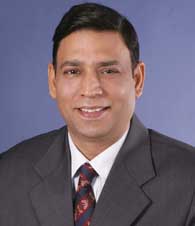|
Executive Interviews: Interview with Anil Bharadwaj on Managing Troubled Times
March 2009
-
By Dr. Nagendra V Chowdary
 Anil Bharadwaj
Anil Bharadwaj Anil Bharadwaj, Secretary General, Federation of Indian, Micro and Small & Medium Enterprises 
First, a word about Federation of
Indian Micro and Small & Medium
Enterprises (FISMEs). What is the
scope of its operations and nature of
its activities? Any milestones as on
date, for the Federation?
FISME came into being in 1995 as a
Federation of geographical and
sectoral associations of Small and
Medium Enterprises (SMEs) in India
spread across districts and states. It
was established as National Alliance
of Young Entrepreneurs (NAYE) in
1967, when Indian government
started monumental initiatives for
small industry promotion. India was
a different country then, inward
looking, interventionist and hugely
protectionist.
|
|
NAYE had a contextual
agenda which suited that era. After
India’s embarking upon liberalization
in 1991 and its accession to WTO in
1995, it called for a fundamentally
different approach for SME
promotion. NAYE along with 8 state
level associations gave birth to FISME
to lead SMEs in the changed
economic realities.
Its mindset, mission and activities
have been shaped by these national
and global developments. It focuses
primarily on trade and market access
issues and reforms with the twin
objective of establishing
entrepreneurial and competitive
environment at home and greater
market access for Indian SMEs in
India and abroad. The key thematic areas of work at
FISME constitute:
- Internationalization of SMEs
which reflects in our activities such
as networking with SME associations
abroad and organization of trade fairs,
trade delegations, hand-holdingtraining,
BDS development among
others.
- Mainstreaming of trade
issues among SMEs and their
associations, engaging us in
continuous research, sensitization on
trade issues and organization of
collective initiatives
- Strong orientation for
reforms in regulatory environment
and promotional policies in tune
with changing world trade order to
enhance competitiveness of SMEs
vis-à-vis their larger domestic
counterparts and foreign firms –
engaging us in research, bringing out
policy papers and organization of
campaigns.
-
What sectors/industries do you
think are amenable for SME operating
model?
SMEs operate everywhere. There are
only a few exclusions. Sectors not
amenable to SMEs are the ones where
entry barriers are very high. Such
barriers could be of very high capital
requirement in sectors such as
aircraft, nuclear energy, mining, oil
exploration and refining, semiconductor
etc., or induced by
technology or policy. -
Do you find clusters operating in
Indian SME sector across the country,
for instance, Surat for gems and
jewellery, Salem and Erode for
textiles, etc? What are the pros and
cons of operating in a cluster?
There are around 400 industrial
clusters and more than 3000 artisan
clusters in India. MSMEs tend to
cluster around naturally. Evolution of
industrial clusters or clustering of
firms at a place could be in response
to a wide range of reasons: from
nearness of markets to availability of
skilled manpower at a geographical
location to need to respond to a
specific challenge. The phenomenon
of clustering also enables them
achieve economy of scale and they
can thrive on specialization of value
chain clustered around at one place.
At the same time MSMEs in clusters
also suffer from malice of ‘path
dependency’ of technology and of
markets. The crowd produce the
same way, the same type of products
and serve same type of customers.
Each can bleed the other out.
Clustering alone does not bestow
much virtue but provides for a platform whereupon competitive
strategies could be built through
positive externalities. However, the understanding of
dynamics of clusters in India is very
superficial. It is like blinds describing
the elephant- each development
agency and ministry has its own
definition of cluster and its own logic
of intervention. Current debate on
clusters in India is full of sound and
fury, signifying little. We as a country
have not yet grasped the means and
ways to harness the potential of
clustering.
1.
Troubled Times Case Study
2. ICMR
Case Collection
3.
Case Study Volumes
|
